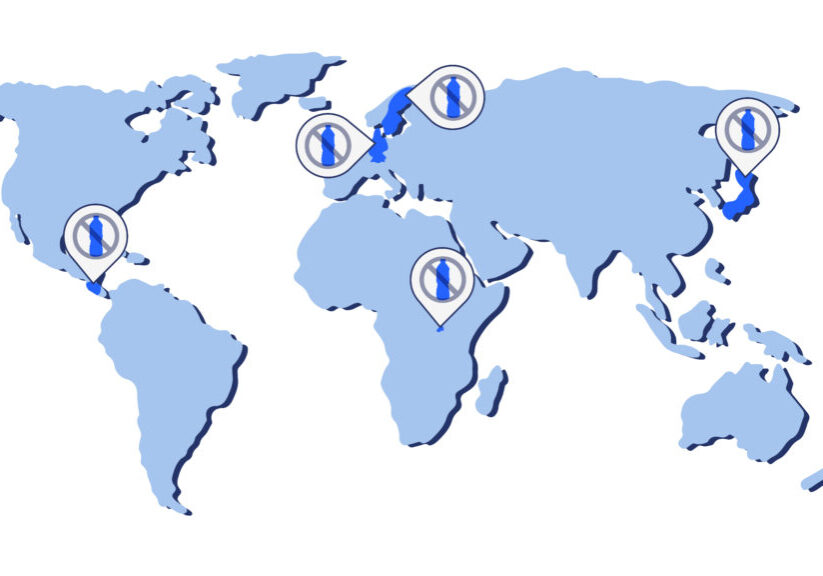September 19, 2024. We can learn a lot from countries taking bold action to reduce plastic production and make use (and re-use) of the plastic that we’ve already produced. These countries show that through new policies, green technologies, and better public awareness, reducing plastic waste can be efficient and rewarding.
Not all plastic management methods will work everywhere, but understanding what works for some will help us all tackle the global plastic problem faster.
Plastic production currently uses 14% of the world’s oil, and according to the International Energy Agency, petrochemicals will drive half of the growth in oil demand by 2050. That means there’s a lot of room for improvement! Plastics harm the environment at every stage, with 25% incinerated and 55% ending up in landfills or out in nature.
Swift, global action is needed to end this detriment to our health and the planet’s ecosystems, and these nations provide valuable examples of how we can start to make a real difference.
Refill, not landfill
Rwanda
“Use of non-biodegradable polythene bags is prohibited.” You’ll see that sign when landing at the airport of Rwanda’s capital city—and your eyes aren’t deceiving you. Border agents will check if you’ve got a plastic bag with you.
Rwanda emerged as a global leader in the fight against plastics in 2008 when it banned plastic bags. Since then, they have been on course to eliminate all single-use plastic. Along with other sustainability policies and civic engagement, the country has earned some unique distinctions. Kigali, Rwanda’s capital, for example, is celebrated as the cleanest city on the African continent.
Banning Single-use Plastics. In 2003, an investigation led by the Rwandan Ministry of Health revealed that single-use plastic items were causing significant environmental problems. Plastics were blocking water channels, threatening biodiversity in water bodies, clogging drainage systems, and preventing water infiltration into the soil. Alarmed by the negative impact on agriculture and the broader environment, Rwanda started taking its decisive legal action. Eleven years later, the country expanded its to other popular single-use items, such as bottles, straws, plates, and forks. Rwanda led the way, 34 African countries have followed and implemented their own bans on plastic.
Community Participation. Rwanda’s dedication to reducing plastic waste is clear through both government action and citizen involvement. The practice of Umuganda, meaning “coming together in common purpose,” is rooted in traditional Rwandan culture. Reintroduced in 1998 to aid the nation’s rebuilding after the genocide, Umuganda is now sanctioned and occurs on the last Saturday of each month. During this time, citizens aged 16 to 65 participate in community service, including plastic waste cleanup. They also engage in debates regarding what needs to be done in the community.
Germany
Germany boasts the highest recycling rate in Europe, recycling roughly 67% of its garbage waste on a municipal level. Thanks to mandatory waste sorting policies, an impressive deposit refund scheme, and high public awareness about recycling correctly, the nation provides a strong example of how to engage citizens in eco-friendly waste management.
Reducing Excessive Packaging. Do you ever look at all the layers of plastic and cardboard waste in your deliveries and lament? Germany’s Packaging Act (VerpackG), which went into effect in 2019, targets the reduction of excessive packaging. This legislation requires manufacturers to contribute to the cost of recycling their packaging, thus incentivizing the reduction of plastic use from the beginning.
Ambitious Bottle Deposit System: Germany’s impressive recycling rate can be largely attributed to its ambitious and country-wide embrace of the deposit return system (DRS), known as the Pfandsystem.
Established in 2003, this system incentivizes recycling by offering a small refund for returning bottles and cans to designated locations, making the recycling process both enjoyable and rewarding.
Imagine you’re a tourist in Germany, enjoying a refreshing beverage on a sunny day. When you purchase your drink at the store, you’ll pay a small deposit, ranging from €0.08 to €0.25. This price, called the ‘Pfand,’ is reflected on the bottle’s label. Once you’re finished, you can return the bottle to one of the many return locations at retail stores and supermarkets. There, a machine scans and processes your bottle, and you receive a receipt that allows you to get your money back at the checkout. Germany’s effective public education about the system has led to an impressive 98.4% total return rate, reflecting enthusiastic participation from its citizens.
Did you know? In the U.S.A., bottle deposit schemes, or “bottle bills,” currently exist in ten states, including California, New York, and Vermont. We have yet to enjoy the same kind of citizen engagement as in Germany, however, as a result of lower public awareness and deposit values.
Sweden
Sweden has emerged as a global leader in environmental sustainability, taking bold steps to reduce plastic waste and promote a circular economy.
Ambitious Waste-to-Energy Program: Sweden’s advanced waste-to-energy (WTE) program is a cornerstone of its waste management strategy. The country pioneered WTE technology, which converts waste into energy, in the mid-twentieth century, with its first plant operating amid the post-war home-building boom in the late 1940s. The impact has been massive: thanks to this innovative approach, only 1% of the country’s trash ends up in landfills. 47% is recycled, and 52% is converted into energy, providing homes around the Nordic country with heat and electricity.
More exciting developments are taking place in Sweden’s urban areas. The city of Stolkholm has built an underground waste collection system: thanks to this, waste chutes, placed in designated collection points throughout the city, take people’s trash and transport it to waste-to-energy incinerators. It’s real, but sounds like something out of a science fiction movie. How’s that for an urban development model for the future?
National Strategy for a Circular Economy: In July 2020, the Swedish government presented a national strategy to transition to a circular economy. Unlike a linear economy, where natural resources become waste at the end of their journey from production to disposal, a circular economy aims to create a closed-loop system where material goods and products continue to bring utility to citizens for as long as possible.
Key focus areas in Sweden’s strategy include investing in sustainable product design, promoting the use of toxin-free materials, and educating consumers to support circular business models in their everyday lives. This comprehensive approach ensures that materials remain in use for as long as possible. Through these comprehensive efforts, Sweden demonstrates how effective policies and innovative programs can lead to significant environmental benefits, setting a benchmark for other countries to follow.
Costa Rica
Costa Rica, in a bid to protect its natural biodiversity, became one of the world’s leaders in environmental protection by stating a desire to become carbon neutral as a country in 2007. While it will take them until 2050 to meet this goal, the country already runs entirely on renewable energy for more than 300 days of the year; no other country of its size has done this.
Another key part of the country’s plan to meet net-zero? Reducing its plastic consumption.
Enhancing Recycling Efficacy: Aligning with the country’s broader goal of becoming carbon neutral by 2050, Costa Rica passed legislation banning the sale and distribution of single-use plastic shopping bags, straws, and cutlery. The government passed this law in 2019, along with measures aimed at reducing the impact of plastic bottles. Now, importers and manufacturers of plastic bottles must regulate the amount of recycled resin used and invest in less harmful waste disposal methods. The legislation encourages companies to partner with municipalities in improving waste management, fostering collaboration that is essential for achieving Costa Rica’s ambitious environmental sustainability goals.
Researching Eco-Friendly Alternatives: In order to make the single-use plastic ban feasible for businesses, Costa Rica is leading the way in researching eco-friendly alternatives. One notable example involved students at the University of Costa Rica who developed a biodegradable material from bananas that proved to be five times stronger than plastic. This innovation highlights the potential of sustainable materials. Imagine all we could accomplish if other countries followed suit.
Japan
Japan has a long way to go in the race to tackle plastic pollution. The country ranks as the second-largest generator of plastic packaging waste per capita after the US. But recent policy shifts, combined with the country’s unique conservation culture, signals a plastic reduction and recycling juggernaut soon to be.
Waste Not, Want Not: The expression Mottainai can be roughly translated into “waste not, want not,” deriving from the words mottai (importance of sanctity) and nai (lack). This centuries old-principle of Japanese philosophy permeates modern society, and transforms resource conservation into a part of the cultural ethos. Driven by Mottainai, Japanese people are more inclined to recycle and reuse items in their everyday lives, seeing value and potential in what other people may try to discard. That’s why over 80% of Japan separates garbage into 10 different categories for collection and recycling. And it’s likely a big part of the reason why the country has long seen a plastic recycling rate above 85%.
Enhanced Waste Management: Japan has recently made significant strides to improve its waste management system through the implementation of the Act on Promotion of Resource Circulation for Plastics, which went into effect in April 2022. This legislation does many things, including:
- Pushes manufacturers to design products for easier recycling
- Requires major retailers and hotel chains to use plastic products made from 60% recycled or biodegradable materials by 2030.
- Asks convenience stores and hotels to begin charging for plastic items like disposable cutlery and toothbrushes.
In response, Japanese businesses are planning to increase plastic recycling and adopt biodegradable alternatives in the near-future. Companies like Kirin Holdings, a large beer conglomerate, has indicated it will use 50% recycled plastics in its products by 2027, just three short years from now.
A Way Forward?
While we often talk about the importance of recycling and many American companies tout ESG as a top priority, the United States consistently ranks as one of the highest plastic polluting countries. And we have little civic engagement to fix this problem: US households throw 76% of their recyclables into the trash instead of the recycling bin. (But maybe it’s because we already know our recycling system is broken.)
So, what can we do? To effectively reduce plastic pollution, we should embrace more ambitious policies. For instance, banning commonly used single-use plastics—including bottles, straws, and bags—can significantly protect both the environment and public health. Bold actions in plastic reduction are crucial for making a real impact, even if they seem like too big of a change at first.






